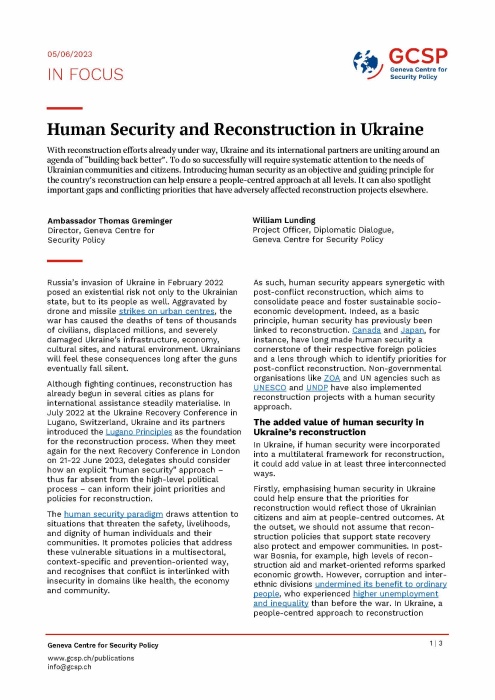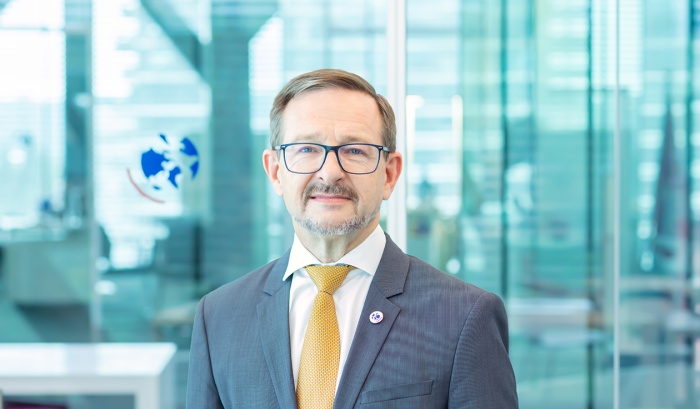Human Security and Reconstruction in Ukraine
With reconstruction efforts already under way, Ukraine and its international partners are uniting around an agenda of “building back better”. To do so successfully will require systematic attention to the needs of Ukrainian communities and citizens. Introducing human security as an objective and guiding principle for the country’s reconstruction can help ensure a people-centred approach at all levels. It can also spotlight important gaps and conflicting priorities that have adversely affected reconstruction projects elsewhere.
Russia’s invasion of Ukraine in February 2022 posed an existential risk not only to the Ukrainian state, but to its people as well. Aggravated by drone and missile strikes on urban centres, the war has caused the deaths of tens of thousands of civilians, displaced millions, and severely damaged Ukraine’s infrastructure, economy, cultural sites, and natural environment. Ukrainians will feel these consequences long after the guns eventually fall silent.
Although fighting continues, reconstruction has already begun in several cities as plans for international assistance steadily materialise. In July 2022 at the Ukraine Recovery Conference in Lugano, Switzerland, Ukraine and its partners introduced the Lugano Principles as the foundation for the reconstruction process. When they meet again for the next Recovery Conference in London on 21-22 June 2023, delegates should consider how an explicit “human security” approach – thus far absent from the high-level political process – can inform their joint priorities and policies for reconstruction.
The human security paradigm draws attention to situations that threaten the safety, livelihoods, and dignity of human individuals and their communities. It promotes policies that address these vulnerable situations in a multisectoral, context-specific and prevention-oriented way, and recognises that conflict is interlinked with insecurity in domains like health, the economy and community.
As such, human security appears synergetic with post-conflict reconstruction, which aims to consolidate peace and foster sustainable socio-economic development. Indeed, as a basic principle, human security has previously been linked to reconstruction. Canada and Japan, for instance, have long made human security a cornerstone of their respective foreign policies and a lens through which to identify priorities for post-conflict reconstruction. Non-governmental organisations like ZOA and UN agencies such as UNESCO and UNDP have also implemented reconstruction projects with a human security approach.
The added value of human security in Ukraine’s reconstruction
In Ukraine, if human security were incorporated into a multilateral framework for reconstruction, it could add value in at least three interconnected ways.
Firstly, emphasising human security in Ukraine could help ensure that the priorities for reconstruction would reflect those of Ukrainian citizens and aim at people-centred outcomes. At the outset, we should not assume that reconstruction policies that support state recovery also protect and empower communities. In post-war Bosnia, for example, high levels of reconstruction aid and market-oriented reforms sparked economic growth. However, corruption and inter-ethnic divisions undermined its benefit to ordinary people, who experienced higher unemployment and inequality than before the war. In Ukraine, a people-centred approach to reconstruction calls notably for the greater prioritisation of social policy alongside macroeconomic stabilisation and growth.
Secondly, human security can also draw attention to post-conflict sources of insecurity that transcend sectors and require a comprehensive response, such as small arms proliferation, organised crime, and discrimination against minorities. These do not necessarily constitute immediate threats to the state, nor priorities for conventional reconstruction efforts. Yet they appear significant from the perspective of the people of Ukraine, carry a high risk of regional spillover and, if ignored, can in some cases be exacerbated by the influx of aid. A human security agenda could be a catalyst for coordinated assessments and action on such issues among Ukrainian authorities and inter-national and civil society actors specialising in various fields.
Thirdly, as a concept that illuminates links between security, development, and human rights, human security can help to address the type of conflicts between civilian and military assistance that at times adversely affected reconstruction efforts in Afghanistan and elsewhere. For example, while some states may choose to arm Ukraine, a human security approach stresses the need to establish strong mechanisms to ensure that these weapons are not diverted into the wrong hands. Similarly, Ukraine’s self-defence needs may justify controls on the information space, but should be weighed against citizens’ right to voice concerns, including about reconstruction policy. If human security is made a priority in assistance to Ukraine, these tensions are more likely to gain attention and be addressed.
Putting human security into practice
If a human security approach has the potential to make reconstruction more equitable and effective, why was it not referenced in the Lugano Declaration and Principles that laid the foundation for reconstruction in Ukraine? Some experts and practitioners consider human security to be too broad a concept to offer practical solutions – yet they may be overlooking how the concept has increasingly been operationalised and applied. Indeed, a human security approach can have concrete implications for reconstruction efforts in Ukraine.
At the policy level, to achieve the aforementioned added value and promote a more people-centred reconstruction agenda, human security should be a core principle in the overarching multilateral framework for reconstruction. Ukraine’s Recovery and Development Plan is recognised as a “living document which will need to be consulted and adapted over time”. Equally, the Lugano Principles will have to be developed into a detailed multilateral framework with specific targets and conditions as reconstruction intensifies. There is thus still room for human security to shape the agenda. Moreover, recent city-based reconstruction initiatives, UN4Kharkiv and UN4Mykolaiv, are already starting to integrate human security into local reconstruction.
More concretely, Ukraine and its partners should establish mechanisms to ensure that people’s needs are listened to and prioritised throughout the reconstruction process. Large-scale surveys can be employed to identify trends in people’s perceptions of insecurity and reveal the most urgent needs, whether nationally or locally. Reconstruction efforts should in part be assessed against such subjective indicators and adjusted accordingly.
In addition, a human security approach would favour a subsidiarity principle whereby local and regional governments take a leading role in implementing solutions embedded in local realities. The vulnerabilities of the country’s different communities are likely to vary across Ukraine. Civil society organisations should be enabled to give feedback to local authorities and participate in people-centred reconstruction where appropriate, such as in information campaigns or community-based reconciliation activities. Lugano Principle 4 on “Democratic participation”, including “local self-governance”, hints at such an approach.
Finally, focusing on human security would further underscore the crucial importance of aid oversight and anti-corruption reform as key components of multilateral reconstruction efforts. Corruption is a primary obstacle to ensuring that people directly benefit from reconstruction, especially at the local level.
Conclusion
Unlike most other sites of recent international reconstruction projects, Ukraine will be recovering not from intrastate, but interstate conflict. Notwithstanding the many pressing threats to civilians, there is a particular need for reconstruction to improve the security and resilience of the state. This includes reducing Ukraine’s strategic vulnerabilities such as exposed trade routes and energy dependency. This need, however, does not diminish the pertinence of human security, but calls for a balanced and multi-pronged approach to recon-struction. As Ukrainian scholars Khylko and Tytarchuk write, “in democratic societies, human security and state security are interconnected components that complement each other”. Only when people are adequately protected against the wide range of threats that they face can society become truly resilient. Human security can therefore be a vital piece of the puzzle if Ukraine and its partners are to “build back better” in a people-centred way.
Disclaimer: The views, information and opinions expressed in this publication are the author’s/authors’ own and do not necessarily reflect those of the GCSP or the members of its Foundation Council. The GCSP is not responsible for the accuracy of the information.



